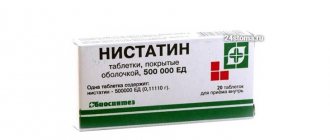- Outpatient department
Outpatient department » - Gastroenterology
Gastroenterology »
- About the direction
About the direction »
- Gastritis: symptoms, diagnosis and treatment
Gastritis is perhaps the most common disease of the gastrointestinal tract. Almost every second resident of our country suffers from it. That is why it is so important to know the first signs and symptoms of this disease in order to start treatment on time and not neglect your health.
Gastritis (from the Latin gastritis, from the ancient Greek γαστήρ (gaster) - “stomach” + -itis inflammatory or inflammatory-dystrophic changes in the mucous membrane) is a collective concept that is used to refer to various inflammatory and dystrophic changes in the gastric mucosa. Damage to the mucous membrane can be primary, considered as an independent disease, caused by poor nutrition, and secondary, caused by other infectious and non-infectious diseases or intoxication.
Types of gastritis
Acute gastritis
In modern medicine, there are several types of acute gastritis:
Simple (catarrhal) gastritis develops as a result of ingestion of stale food contaminated with pathogenic microbes (foodborne toxic infection), rotavirosis, allergies, or as a result of damage to the gastric mucosa by medications. With catarrhal gastritis, the surface layer of the mucous membrane is destroyed, which is quickly restored after the cessation of the irritating factor.
Corrosive (erosive) gastritis. This type of gastritis develops after concentrated acids or alkalis enter the stomach, which corrode the gastric mucosa. In this case, not only the superficial, but also the deep layers of the gastric mucosa are destroyed, so this form of the disease often gives rise to peptic ulcers or the formation of scars.
Phlegmonous gastritis is a purulent inflammation of the stomach that can develop as a result of penetration of a foreign object (for example, a fish bone) into the stomach wall with subsequent infection of this area. A distinctive feature of this type of gastritis is high fever and unbearable pain in the epigastric region. Phlegmonous gastritis requires immediate surgical intervention, as it can develop into peritonitis (extensive inflammation of the abdominal organs) and be fatal.
Fibrinous gastritis. It occurs very rarely against the background of sepsis (blood poisoning).
With proper treatment, acute gastritis (depending on the form) lasts up to 5 - 7 days, but complete recovery of the stomach occurs much later.
Often acute gastritis can become chronic.
Chronic gastritis
Chronic gastritis can develop as a consequence of acute gastritis or as an independent disease. Its danger lies in the fact that it can occur for a long time without showing any symptoms.
In the development of the disease, as a rule, there are periods of exacerbation and remission. During periods of exacerbation of chronic gastritis, short-term attacks of pain, discomfort in the upper abdomen, a feeling of heaviness, nausea after eating, and heartburn may appear, which indicates a dysfunction of the natural “valves” of the stomach and the reflux of acidic stomach contents into the esophagus.
A characteristic feature of chronic gastritis is the gradual growth of connective tissue in the gastric mucosa, replacing the cells that produce gastric juice (atrophy of the gastric mucosa). Chronic gastritis is often accompanied by a decrease in the production of gastric juice and acid (hypoacid gastritis).
Helicobacter pylori infection, which parasitizes the stomach, disrupts the renewal processes of the mucous membrane; thus, when old cells die, new ones cannot be formed. This leads to gradual degradation of the gastric mucosa with loss of function of the glands that produce gastric juice.
Causes of nausea
Nausea can occur for a variety of reasons, ranging from gastroenteritis caused by a viral infection (a common but self-limiting condition in young children) to morning sickness in early pregnancy. Nausea can be caused by medications, overeating, or migraines. In some cases, this symptom may indicate serious and sometimes life-threatening conditions: appendicitis, kidney disease, liver disease, central nervous system disease, heart attack, brain tumor.
Other causes of nausea include:
- motion sickness in transport, including on water (kinetosis);
- benign paroxysmal positional vertigo (BPPV);
- Meniere's disease;
- food poisoning;
- rotavirus and other infections;
- coronavirus infection (COVID-19);
- ear infections;
- meningitis;
- gastroesophageal reflux disease (GERD);
- stomach ulcer;
- Crohn's disease;
- irritable bowel syndrome;
- pancreatitis;
- pancreas cancer;
- decreased activity of the muscular apparatus of the stomach (gastroparesis);
- intussusception in children;
- pyloric stenosis in infants;
- allergy to cow's milk protein;
- intestinal obstruction;
- stress, fears, generalized anxiety disorder, depression;
- anorexia, bulimia;
- vestibular neuronitis;
- alcohol abuse;
- exposure to chemicals;
- cholecystitis;
- cholelithiasis;
- acute liver failure;
- hepatitis;
- diabetic ketoacidosis;
- heart failure, heart attack;
- hyperthyroidism;
- hypoparathyroidism, hyperparathyroidism;
- intracranial hematoma;
- chemotherapy, radiation therapy.
Causes of gastritis
The main causes of gastritis are:
- poor nutrition;
- hasty eating and poorly chewed food or dry food;
- eating food that is too hot or too cold;
- eating savory foods (mostly spicy and highly salted);
- smoking;
- alcohol consumption;
- stress;
- infection with the microbe Helicobacter pylori;
- chewing gum on an empty stomach.
Xerostomia: causes
As a rule, the causes of xerostomia are “hidden” not in the salivary glands themselves, but in a disease of any system of the body or a general infectious disease. This condition is mainly caused by:
- Infectious diseases: tonsillitis, tuberculosis, HIV, tonsillitis, mumps (aka “mumps”, an infectious disease of the parotid salivary glands).
- Hypertension or severe iron deficiency anemia.
- Rheumatoid arthritis, as well as some diseases of the endocrine system: thyrotoxicosis (occurs when the thyroid gland is damaged), diabetes mellitus (develops when the function of the pancreas is impaired), sialadenitis (inflammation of the salivary glands themselves).
- Head or neck injuries, constant mouth breathing due to injury to the nose or the formation of polyps in the sinuses.
- Long-term use of certain groups of medications, dehydration with prolonged fever or vomiting.
- Bad habits: drinking alcohol, smoking, drug use.
The functions of the salivary glands are not necessarily impaired in all of these diseases and conditions, but if a person has xerostomia, they will be considered as possible causes.
Symptoms of gastritis
So, how can you recognize that you have begun to develop gastritis? It is worth listening to your body and analyzing why pain bothers you, at what time it occurs and how often it happens.
Symptoms of gastritis:
- abdominal pain: sharp paroxysmal or constant painful;
- nausea is constant or intermittent, often occurring immediately after eating;
- heartburn;
- belching with a sour smell;
- repeated vomiting (in the case of acute gastritis, vomiting with blood is possible, since internal bleeding may open in the stomach);
- increased salivation;
- sometimes dry mouth;
- bowel dysfunction: constipation or diarrhea;
- from the whole body: severe general weakness, dizziness, headache, sweating, increased temperature, decreased blood pressure, increased heart rate - tachycardia;
- decreased appetite;
- unpleasant taste in the mouth;
- feeling of heaviness in the stomach after eating;
- bloating, rumbling in the stomach, flatulence;
- anemia, brittle and dry hair, split nails.
The first signs of vascular complications and disasters
- hypertensive crisis;
- heart attack;
- transistor ischemic attack (TIA);
- stroke.
Symptoms of a hypertensive crisis:
- sudden onset within minutes or 1-3 hours;
- the blood pressure level is individually high (in one patient it is 240/120, in another – 130/90). This depends on the initial blood pressure level. If a patient has persistently low blood pressure, even a slight increase can cause a hypertensive crisis;
- presence of cardiac complaints (heart pain, palpitations);
- presence of complaints from the brain (headaches, dizziness, various visual impairments);
- the presence of complaints from the autonomic nervous system (chills, trembling, sweating, a feeling of a rush of blood to the head, a feeling of lack of air, etc.).
Symptoms of myocardial infarction:
- most common: pain and pressure in the chest,
Patients suffering from heart attacks may experience a variety of symptoms, such as:
- pain, feeling of fullness and/or squeezing in the chest;
- jaw pain, toothache, headache;
- shortness of breath;
- nausea, vomiting, general feeling of pressure in the pit of the stomach (upper center of the abdomen);
- sweating;
- heartburn and/or indigestion;
- pain in the arm (most often in the left, but can be in any arm);
- upper back pain;
- general painful sensation (vague feeling of malaise).
Symptoms of transistor ischemic as well as (TIA):
Typically, symptoms of transient ischemic attacks can last from a few minutes to an hour and include:
- feeling of weakness, numbness, tingling sensation in one half of the body;
- paralysis of arms or legs;
- visual disturbances (darkening of the eyes);
- loss of speech clarity;
These symptoms usually disappear completely within 24 hours, but may recur.
Symptoms of a stroke:
- sudden numbness or weakness of a certain part of the face, arm, leg (especially one-sided);
- sudden loss of vision in one or both eyes;
- sudden paralysis (usually one-sided);
- sudden dizziness or headache with nausea and vomiting;
- sudden difficulty speaking;
- difficulty swallowing;
- dizziness, loss of balance and coordination;
- loss of consciousness.
You can talk about an increased risk of stroke if:
- one or more of your blood relatives has had a stroke or myocardial infarction;
- you have been diagnosed with a tendency to microthrombosis;
- You suffer from arterial hypertension, angina pectoris, dyscirculatory encephalopathy;
- you have diabetes;
- you smoke or abuse alcohol;
- your lipid metabolism is disturbed (increased blood sugar and cholesterol levels), your body weight is significantly higher than normal;
- You have already had or currently have cerebrovascular accidents: neurocirculatory dystonia, transient ischemic attacks, hypertensive cerebral crisis.
How to prevent a stroke?
About half of strokes can be prevented. This is possible because many risk factors for stroke can be controlled. Here are these risk factors that can be prevented:
- High blood pressure (above 140/90 mmHg),
- Atrial fibrillation (a disease in which there is rapid chaotic contraction of the atria, resulting in blood clots in their cavities),
- Diabetes mellitus without adequate treatment,
- Increased cholesterol levels
- Smoking,
- Alcohol abuse
- Obesity,
- Disease of the carotid or coronary arteries.
To avoid vascular accidents, pay attention to your well-being in a timely manner. Get rid of risk factors (smoking, alcohol abuse, excess weight, physical inactivity). Monitor your blood pressure, blood sugar and cholesterol levels.
AND REMEMBER!
Regardless of the presence of complaints, once a year it is mandatory for everyone:
- undergo a fluorographic examination;
- measure blood pressure;
- visit an examination room (for women) and a urologist (for men);
- if you are over 40 years old, measure intraocular pressure, determine cholesterol and blood sugar levels, and undergo an ECG.
We wish you health and a long, interesting life!!!
Narab L.V.
Diagnosis of gastritis
Today, the main way to determine gastritis is fibrogastroduodenoendoscopy or FGDS, which consists of studying the condition of the inner surface of the stomach using a probe, as well as a biopsy - removing a small fragment of tissue for examination.
FGDS makes it possible not to confuse gastritis and ulcer and to determine the type of disease: erosive or non-erosive.
Also, a gastroenterologist, to make a correct diagnosis, may prescribe the following tests:
- General blood analysis.
- Fecal occult blood test.
- Histological examination of a biopsy specimen of the gastric mucosa.
- Cytological examination of a biopsy specimen of the gastric mucosa.
- Two tests for the determination of H. pylori.
- Blood chemistry.
- General urine analysis.
Diet for gastritis
For gastritis with low acidity
Can:
- boiled lean meat: chicken, rabbit;
- meat broths;
- lean fish: pink salmon, hake, cod;
- vegetables in the form of puree or grated: carrots, potatoes, green peas, beets;
- ground fruits, compotes and jelly from apples, raspberries and strawberries;
- porridge (oatmeal, semolina, rice);
- low-fat cottage cheese, milk;
- only squeezed cabbage juice;
- alkaline mineral waters, for example Borjomi (1 glass an hour before meals).
It is forbidden:
- hot and spicy dishes;
- canned food;
- mustard;
- pepper;
- onion;
- hot sauces.
For gastritis with high acidity
Can:
- pureed vegetarian soups;
- dairy products;
- lean fish and boiled meat;
- scrambled eggs;
- porridge, jelly, jelly;
- vegetable purees;
- compotes from fresh (not sour) fruits;
- carrot juice;
- White bread.
It is forbidden:
- coffee and strong tea;
- meat broths;
- smoked meats;
- mustard;
- onion;
- garlic.
For all types of gastritis, split meals are very important - 5-6 times a day.
Gastritis (from the Latin gastritis, from the ancient Greek γαστήρ (gaster) - “stomach” + -itis inflammatory or inflammatory-dystrophic changes in the mucous membrane) is a collective concept used to refer to inflammatory and dystrophic changes in the gastric mucosa of different origins and course. Damage to the mucous membrane can be primary, considered as an independent disease (due to poor nutrition), and secondary, caused by other infectious and non-infectious diseases or intoxication.
Gastritis is perhaps the most common disease of the gastrointestinal tract. Almost every second resident of our country suffers from it.
If you are really looking for your doctor...










